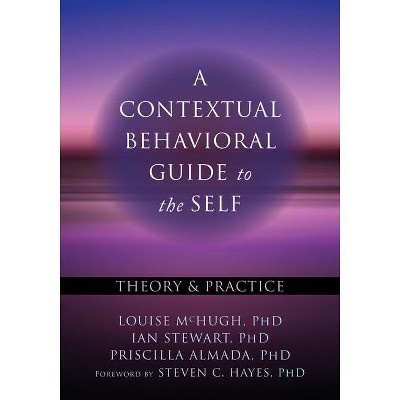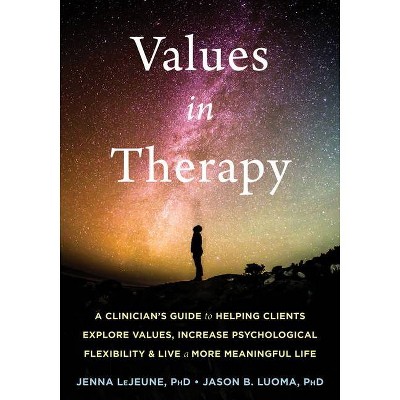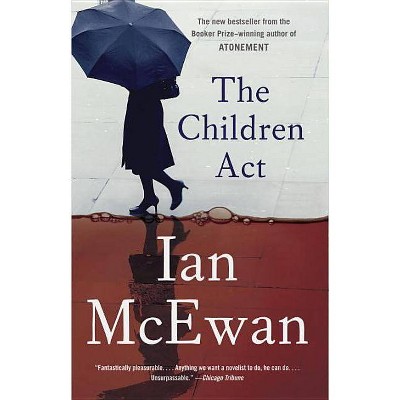A Contextual Behavioral Guide to the Self - (Context Press Mastering ACT) by Louise McHugh & Ian Stewart & Priscilla Almada (Paperback)

Similar Products
Products of same category from the store
AllProduct info
<p/><br></br><p><b> About the Book </b></p></br></br>The self plays an integral role in human motivation, cognition, and social identity. That's why observing the self is such an important element of acceptance and commitment therapy (ACT). However, for many ACT clinicians, it can be difficult to apply this complex theory in everyday practice. A must-have addition to any ACT practitioner's library, <i>A Contextual Behavioral Guide to the Self</i> translates the ACT model's most difficult--yet essential--process into easy-to-apply steps and user-friendly language. With this unique road map, clinicians will help clients develop empathy, compassion, and flexible perspective taking--leading to better treatment outcomes and better lives for clients.<p/><br></br><p><b> Book Synopsis </b></p></br></br><p><b>The self plays an integral role in human motivation, cognition, and social identity. <i>A Contextual Behavioral Guide to the Self </i>translates this difficult--yet essential--therapeutic process into easy-to-apply steps and user-friendly language. </b></p><p>For many clients, it's incredibly difficult to shed preconceived notions of "who they really are," and negative perceptions of the self can lead to feelings of low self-worth that stand in the way of treatment. Furthermore, every client who partakes in acceptance and commitment therapy (ACT) must identify a self as part of their treatment, and clinicians often report that observing the self, or "self as context," is the most difficult of all six core ACT processes. </p><p>Problems with the self arise when clients orient themselves in the world and learn to relate to others, but these problems can vary considerably. For example, some clients may have deficits in developing a strong sense of self in the first place--particularly if they are diagnosed with autism spectrum conditions (ASC). Depressed clients or those with borderline personality disorder (BPD) may develop a skewed, negative sense of self, and those with narcissistic personality disorder (NPD) may develop an inflated sense of self.</p><p>With this unique road map, you will learn to apply the complex theory of the self into everyday practice, and help all clients develop empathy, compassion, and flexible perspective taking--leading to better treatment outcomes and better lives for clients.</p><p/><br></br><p><b> Review Quotes </b></p></br></br><br>"<i>A Contextual Behavioral Guide to the Self</i> is a gold mine of information that can empower both your knowledge and practice. The book is a masterful guide to some of our most advanced research on 'self' experience. I would recommend this to anyone seeking to deepen their ACT practice, or their understanding of what it is to be human, and to have 'a self.'" <br> --<b>Dennis Tirch, PhD</b>, founder of The Center for Compassion Focused Therapy, associate clinical professor at Mount Sinai, and coauthor of <i>The ACT Practitioner's Guide to the Science of Compassion</i>--Dennis Tirch, PhD<br><br>"All of us working with people know that psychological challenges are fundamentally issues of 'self.' Traditionally, behaviorism--unlike other branches of psychotherapy--has had no room for a 'self' concept. In contrast, this unique book--based in behavioral analysis and RFT--places the self, front and center stage. The authors show you clearly, in a scientific and practical framework, how and why the self matters. The underpinning is functional contextualism or contextual behavioral psychology. As you read this book you will understand how the self is created and maintained based on RFT. You will learn a new word, 'selfing, ' which describes how we verbally respond to our own responding. The authors illustrate what is needed for healthy 'selfing, ' and what types of problems and issues may occur. Readers will find generous portions of tips on how to measure, evaluate, and treat problems with 'selfing.' This book is solidly based in RFT research, but it offers a great, practical approach which I am certain all of us who serve people will find useful." <br> --<b>JoAnne Dahl, PhD</b>, professor in the department of psychology at Uppsala University in Uppsala, Sweden; licensed psychologist; psychotherapist; peer-reviewed ACT trainer; and Association for Contextual Behavioral Science fellow--JoAnne Dahl, PhD<br><br>"Few books are able to bring theory to life as well as <i>A Contextual Behavioral Guide to the Self</i>. The authors take us on a fascinating journey to discovering the self--how it develops, how it can lead to psychological suffering, and how to turn it into a source of well-being and growth. Read this book to discover a number of innovative, practical tools and new ways to conceptualize the self with cutting-edge relational frame theory (RFT) research." <br> --<b>Matthieu Villatte, PhD</b>, assistant professor in the department of counseling and health psychology at Bastyr University, and coauthor of <i>Mastering the Clinical Conversation</i>--Matthieu Villatte, PhD<br><br>"It is rare to find a good book on the 'self, ' much less any book on the self, that provides a crystal clear picture of what we mean by the self. <i>A Contextual Behavioral Guide to the Self</i> creates a marvelous balance between cutting-edge science and practical clinical applications to help the practicing clinician effectively intervene with a variety of self-related problems. The writing is exceptionally clear and the clinical examples make important points seem easy to grasp. Getting a handle on what exactly we mean by 'self' and how to work to improve self-related functioning has been a serious, long-term challenge in clinical psychology. This book moves us forward in a major way. Highly recommended!" <br> --<b>Kirk Strosahl, PhD</b>, cofounder of acceptance and commitment therapy (ACT), and coauthor of <i>Inside This Moment</i>--Kirk Strosahl, PhD<br><br>"This excellent book offers an insightful, cutting-edge look at the concept of 'self.' You'll learn about our different senses of self, how these 'selves' develop, what can go wrong with these processes, and what we can do about it therapeutically. There's a gold mine of clinically useful material in here, to help both you and your clients. If you've ever struggled to understand complex ACT concepts such as self-as-context and self-as-process (and let's face it, haven't we all?) this book will set you straight. An essential addition to the library of all contextual behavioral practitioners." <br> --<b>Russ Harris</b>, author of <i>The Happiness Trap</i> and <i>ACT Made Simple</i>--Russ Harris<br><br>"This is a truly remarkable book. The authors use their thorough knowledge of the complex phenomenon of 'the self, ' and work themselves all the way from basic science up to practical, clinical recommendations for psychological treatment. An important read for researchers and clinicians alike." <br> --<b>Niklas Törneke, MD</b>, author of <i>Learning RFT</i> and <i>Metaphor in Practice</i>--Niklas Törneke, MD<br><p/><br></br><p><b> About the Author </b></p></br></br><p><b>Louise McHugh, PhD</b>, is associate professor of psychology at University College, Dublin; a peer-reviewed acceptance and commitment therapy (ACT) trainer; fellow of the Association for Contextual Behavioral Science; and coeditor of <i>The Self and Perspective Taking</i>. <p/><b>Ian Stewart, PhD</b>, is a faculty member in the school of psychology at the National University of Ireland, Galway. He is coauthor of <i>The Art and Science of Valuing in Psychotherapy</i> and <i>ACT and RFT in Relationships</i>, and coeditor of <i>The Self and Perspective Taking</i>. <p/><b>Priscilla Almada, PhD</b>, is a contextual behavioral scientist/practitioner based in Sydney, Australia. She is founder and director of On Becoming Us, an independent, research-based initiative for developing and pursuing prosocial leadership and communities. To further explore or support this work, visit: onbecomingus.com or drpriscillaalmada.com. <p/> Foreword writer <b>Steven C. Hayes, PhD</b>, is foundation professor in the department of psychology at the University of Nevada, Reno, and cofounder of ACT.</p>
Price History
Cheapest price in the interval: 38.49 on November 8, 2021
Most expensive price in the interval: 49.99 on March 10, 2021
Price Archive shows prices from various stores, lets you see history and find the cheapest. There is no actual sale on the website. For all support, inquiry and suggestion messagescommunication@pricearchive.us




















